Child exploitation has been endemic for generations in many regions where we work. The effects of this abuse are widespread: Criminals see children as easy prey for easy money. Communities become grudgingly accustomed—if not comfortable—with the ugly trade. In particularly impoverished areas, sex trafficking is sometimes viewed as a last resort for getting much-needed money to keep families from starvation.
But the most devastating effect is on the victimized children. Each of these kids is a bright, unique soul with their own distinct personality and dreams for the future. Like most kids, they have aspirations for a particular path in life and dreams of what they want to be or do in the future.
Exploitation crushes those hopes and dreams. Imprisoned in a life that relegates these poor kids to little more than a product for sale, children often lose their ability to think positively. Constant trauma causes them to shrink in on themselves, warping their view of the world.
One of our caseworkers in Kenya put it best:

We rescue hopeless people. They don’t see their future.”
But rescue changes all that.
Today, we want to take a look at how rescue changes hearts, lives and whole communities through the eyes of our front-line agents and caseworkers from around the world.
Changing Hearts
Because children are the center of our mission, the change we see in them is always exciting for our agents. Upon rescue, many children’s emotions can include a mix of fear, mistrust, anger and loss of hope.
Our agents know all too well that the days and weeks immediately after rescue can be very difficult, but to witness a child’s personality bloom after they’re safe from the oppression of exploitation is a joy unlike any other.
Grace, one of our caseworkers in Kenya, recalled seeing such a change in a girl we rescued from a forced child marriage. “(She) is now a happy girl who does well in school, and her future seems bright,” she said.
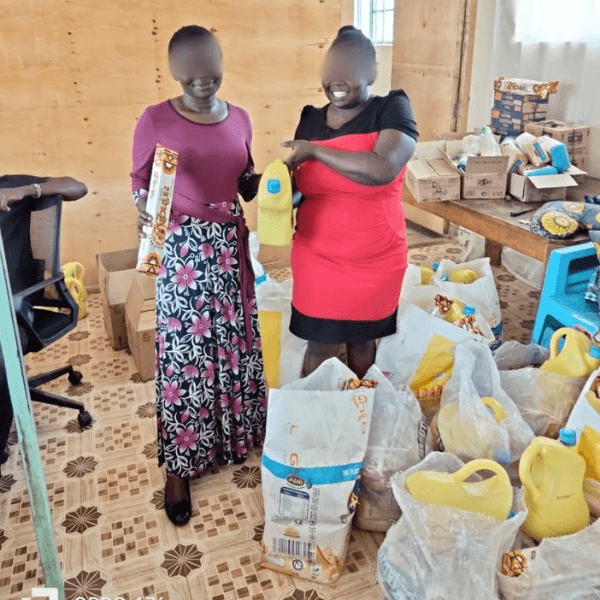
Grace (right) gives a food pack to a rescued child’s guardian
Grace shares in that joy: “I am also a happy caseworker seeing one of the many [rescued children’s] hope restored.”
Jacob, a rescue agent in the Dominican Republic, also witnessed an amazing transformation in a child rescued from forced child marriage.
The girl was abducted from her home when she was only 13 years old and brainwashed into thinking she was in a real, legitimate relationship with her 34-year-old kidnapper. Her parents had no idea where she’d been taken and were frantic for help. Child marriage is illegal in the country; the minimum age to marry is 18 years old, with no exceptions, according to the Dominican Republic’s ratification of the Convention on the Rights of the Child.
When we helped police locate and raid the house, the child, who now had a 3-month-old baby of her own, was dismayed at the thought of being separated from the man who’d been caring for her, brainwashed by his manipulation. Convinced that she’d never be able to survive without provision from her “husband,” she was so distressed upon rescue that she threatened to take her own life.
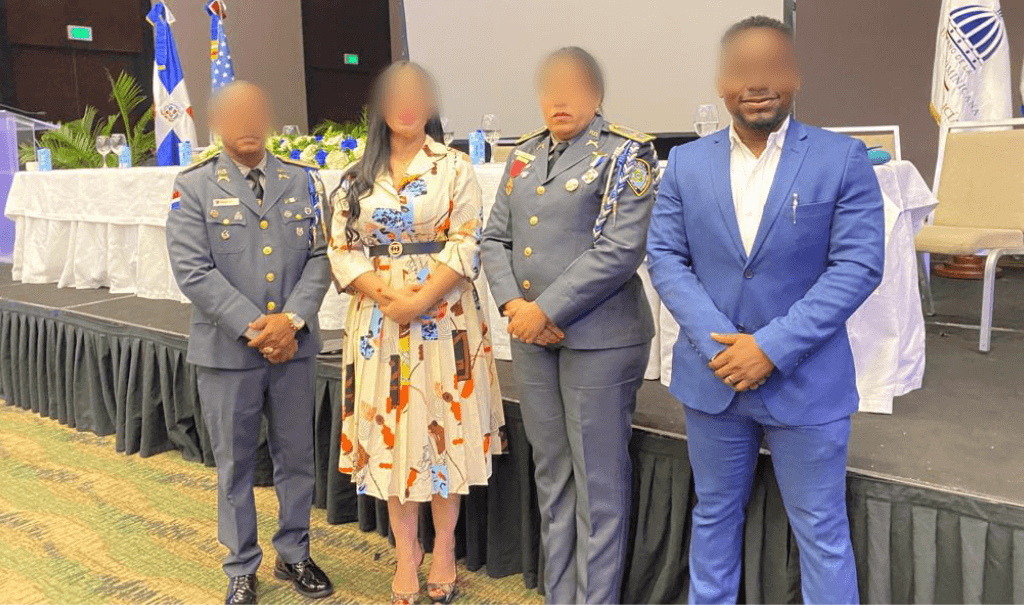
Destiny Rescue Dominican Republic agents, alongside the Dominican Republic National Police
But nearly four years later, this brave, bright young woman is graduating high school with plans to attend university. Jacob couldn’t be prouder. “She is now one of the happiest girls, and her story is impacting a lot of [those] recently rescued…” he said.
Jacob brings to light the fact that these rescued kids are doing more than just bettering themselves; they’re helping other survivors change whole communities.
Changing Futures
Alamani, a business manager in Kenya, shared the potential far-reaching influence he expects from a particular young boy rescued from generational exploitation. The malnourished and neglected child of a mother in the sex industry was forced to live in tragic conditions and witness countless wrongs. This young 11-year-old boy had little hope for the future before rescue.
But now that he’s safe and well-fed with a loving foster guardian, the boy is a diligent student with aspirations of becoming a doctor. Alamani has no doubt that his hard work is the first step in creating a bright new legacy:

He will one day change the story of his family and other children who are going through the same issues he went through.”
Austin, a rescue agent in the Philippines, also shared a story of a survivor who has exciting prospects. The bright child dreamed of becoming a chef before being forced to put her dreams on hold when she was pressured into working in a bar, where more was expected of her than just waiting tables to provide for her family.
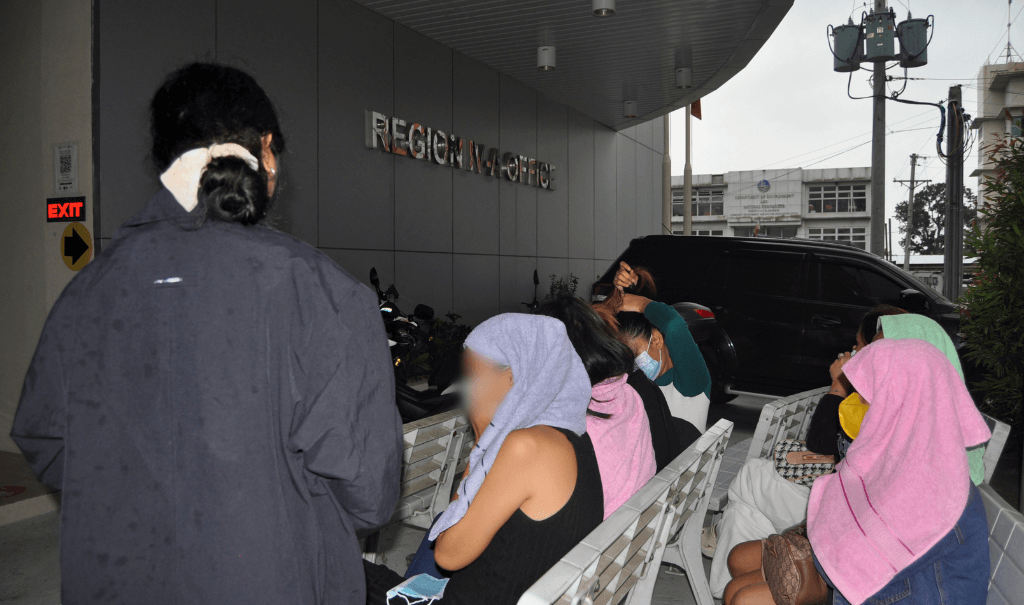
A Destiny Rescue caseworker stands by to help survivors in the stressful moments immediately after a raid
However, because she bravely chose to accept rescue, this enthusiastic girl is now well on her way to realizing her dream: Austin was thrilled when he received a picture of the survivor shortly after she graduated from culinary school with our help.

She had the biggest smile on her face and a bright future ahead,” Austin said.
Changing Cultures
But rescue changes more than just the survivors’ lives. Positivity is just as infectious as negativity. Over time, our staff report how the positive changes ripple from individuals to families to the communities where they serve.
In the Philippines, we’ve actually started to see the practice of child trafficking become stigmatized by the most unlikely group of all: “Many criminals now frown upon, fear, or condemn the exploitation of minors,” Xander, a rescue agent in the Philippines, said.
Our work in his location is helping to alter the cultural perspective of child exploitation in nearly every level of society. So great is the change that even criminals are starting to shun the vile practice.
And for those who choose to continue to sell kids for sex despite the deepening social scorn, the message is clear: “Be careful about taking children for trafficking,” Joe, our country manager in Thailand, said.
Our collaboration with law enforcement has created an alarmingly efficient machine for rescuing kids and putting traffickers behind bars in the region.
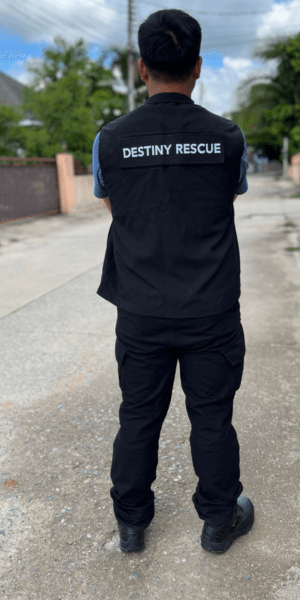
Our Thailand country manager, Joe, poses in his Destiny Rescue gear
But we’ve seen other shifts in communities that are even more encouraging. Instead of viewing child trafficking as a lamentable reality, citizens are starting to realize that there might be another way. Traffickers are not as untouchable as once thought. Economic improvement initiatives are revealing new ways to combat poverty.
Even the at-risk children themselves are beginning to realize their worth.
“My community has seen a lot of changes since Destiny Rescue came in… even the underage children are aware of their rights,” Alamani, the Kenyan business manager we heard from earlier, said.
Thanks to our efforts and brave survivors’ choice to accept freedom, children once trapped in darkness are beginning to see the light of freedom:

By rescuing these young children who… have lost hope in life, their hopes are being restored.”
-Alamani, Kenya Business Manager
We believe all children should have the opportunity to hope and to pursue their dreams for the future. By rescuing a child, you make bright futures possible. Complete the form below to restore a child’s hope today.
Donate with confidence
Over the last three years, 82% of every dollar we spent was used for programs that benefit the children we defend.
Destiny Rescue is recognized by Guidestar, Charity Navigator, the Better Business Bureau and Excellence in Giving for our commitment to transparency, accountability and financial integrity.
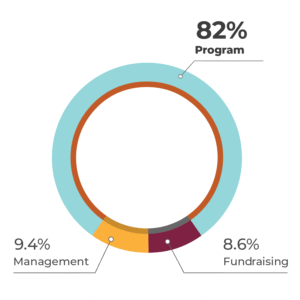


 Australia
Australia New Zealand
New Zealand United Kingdom
United Kingdom

